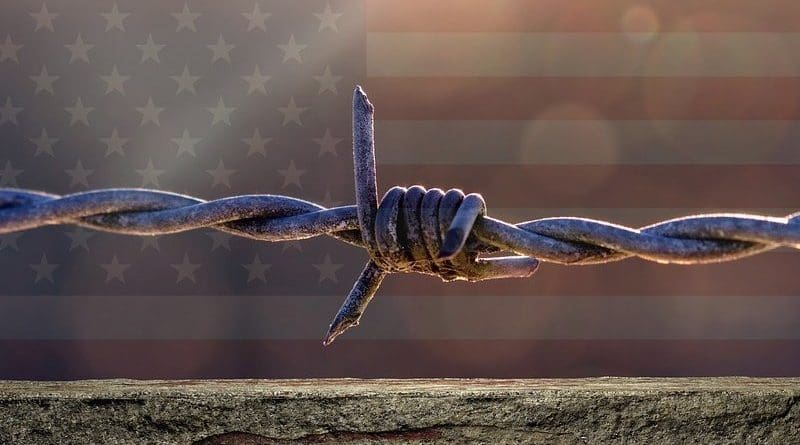Government US Border Enforcement Study Assesses Use Of Military Resources – OpEd
By Jim Kouri
A section of the National Defense Authorization Act requires the Government Accountability Office examine the costs and benefits of an increased Department of Defense role in helping law enforcement officers secure the southwest land border. The mandate directed the GAO to submit a report to the U.S. Congress, which was released on April 18.
The GAO report examined, among other things, the potential deployment of additional military units, increased use of ground-based mobile surveillance systems, use of mobile patrols by military personnel, and an increased deployment of unmanned aerial systems and manned aircraft in national airspace.
The Department of Homeland Security’s Customs and Border Protection bureau admitted to GAO analysts that the southwest border continues to be vulnerable to cross-border illegal activity, including the smuggling of humans and illegal narcotics, which directly contradicts statements made by President Barack Obama, DHS Secretary Janet Napolitano, and the leadership of the U.S. Border Patrol.
Several federal agencies share involvement in border security efforts, including DHS, DOD, Department of Justice, and the State Department. Over the years, the National Guard has played a minor role in helping to secure the southwest land border by providing the Border Patrol with information on the identification of individuals attempting to cross the southwest land border into the United States.
However, Guardsmen were prohibited from taking any actual law enforcement role and critics labeled the National Guard’s deployment as being a “a massive photo op” or “dog-and-pony show” for the news media.
The GAO analysts examined the costs and benefits of a DOD role to help secure the southwest land border, including the deployment of the National Guard, other DOD personnel, or additional units; the challenges of a DOD role at the southwest land border; and considerations of an increased DOD role to help secure the southwest land border.
In September 2011, GAO reported that the DOD estimated a total cost of about $1.35 billion for two separate border operations — Operation Jump Start and Operation Phalanx — conducted by National Guard forces from June 2006 to July 2008 and from June 2010 through September 30, 2011, respectively.
“DOD estimated that it has cost about $10 million each year since 1989 to use active duty Title 10 forces nationwide, through its Joint Task Force-North, in support of drug law enforcement agencies with some additional operational costs borne by the military services,” according to GAO officials.
“Agency officials stated multiple benefits from DOD’s increased border role, such as assistance to the Department of Homeland Security (DHS) Border Patrol until newly hired Border Patrol agents are trained and deployed to the border; providing DOD personnel with training opportunities in a geographic environment similar to current combat theaters; contributing to apprehensions and seizures and deterring other illegal activity along the border; building relationships with law enforcement agencies; and strengthening military-to-military relationships with forces from Mexico,” analysts stated in their report to the House of Representatives.
The GAO analysts noted several challenges for the National Guard and for active-duty military forces in providing support to law enforcement missions. For example, under Title 32 of the United States Code, National Guard personnel are permitted to participate in law enforcement activities; however, the Secretary of Defense has precluded National Guard forces from making arrests while performing border missions because of concerns raised about militarizing the U.S. border.
As a result, all arrests and seizures at the southwest border are performed by the U.S. Border Patrol.
Further, DOD officials cited restraints on the direct use of active duty forces, operating under Title 10 of the United States Code in domestic civilian law enforcement, set out in the Posse Comitatus Act of 1878.
“The idea of placing hundreds — even thousands — of U.S. military personnel on the border to perform non-enforcement duties is a waste of time and money,” said political strategist Mike Baker. “Posse Comitatus prohibits the military from performing law enforcement functions within the United States that target Americans. But protecting America from an invading force — drug cartels, human trafficking operations, and narco-terrorism threats — would more likely than not be appropriate.
In addition, GAO has reported on the varied availability of DOD units to support law enforcement missions, such as some units being regularly available while other units (e.g., ground-based surveillance teams) may be deployed abroad — making it more difficult to fulfill law enforcement requests.
Federal officials noted in the report that several issues and concerns exists regarding additional DOD assistance in securing the southwest border. DOD officials expressed concerns about the absence of a comprehensive strategy for southwest border security and the resulting challenges to identify and plan a DOD role. DHS officials expressed concerns that DOD’s border assistance is ad hoc in that DOD has other operational requirements. DOD assists when legal authorities allow and resources are available, whereas DHS has a continuous mission to ensure border security.
Unfortunately, under the Obama Administration, Departments of State and Defense officials expressed concerns about the perception of a militarized U.S. border with Mexico, especially when Department of State and Justice officials are helping civilian law enforcement institutions in Mexico on border issues.

